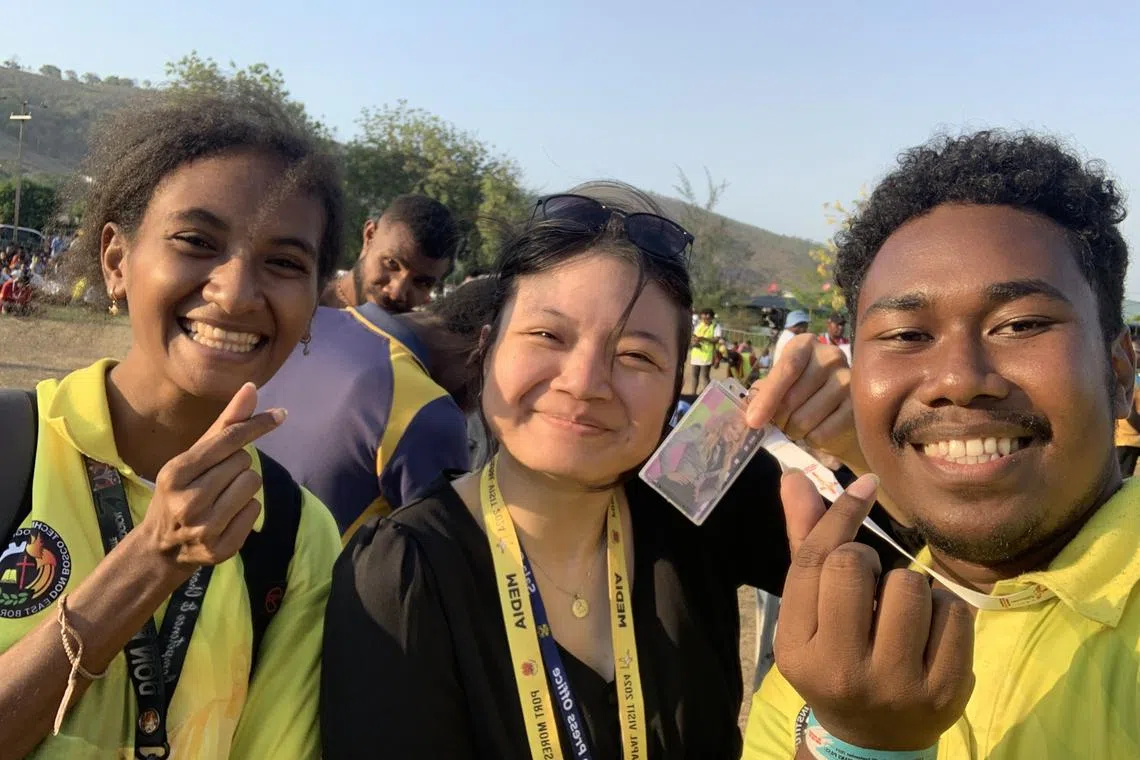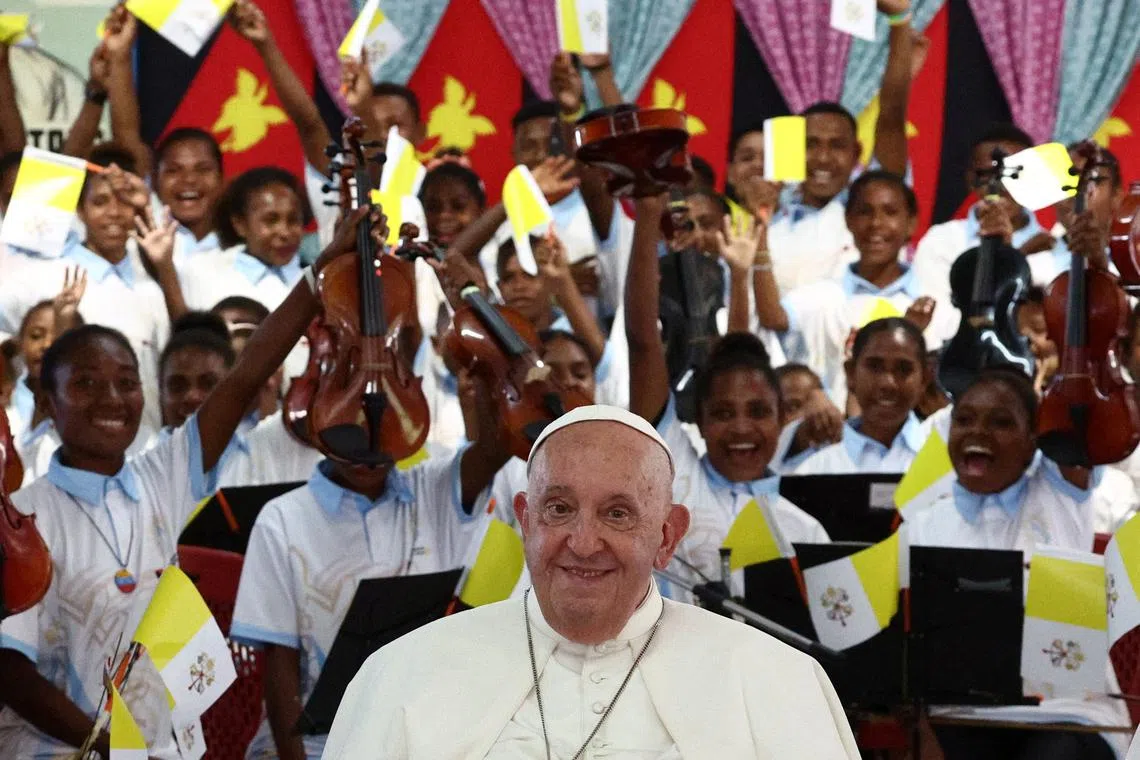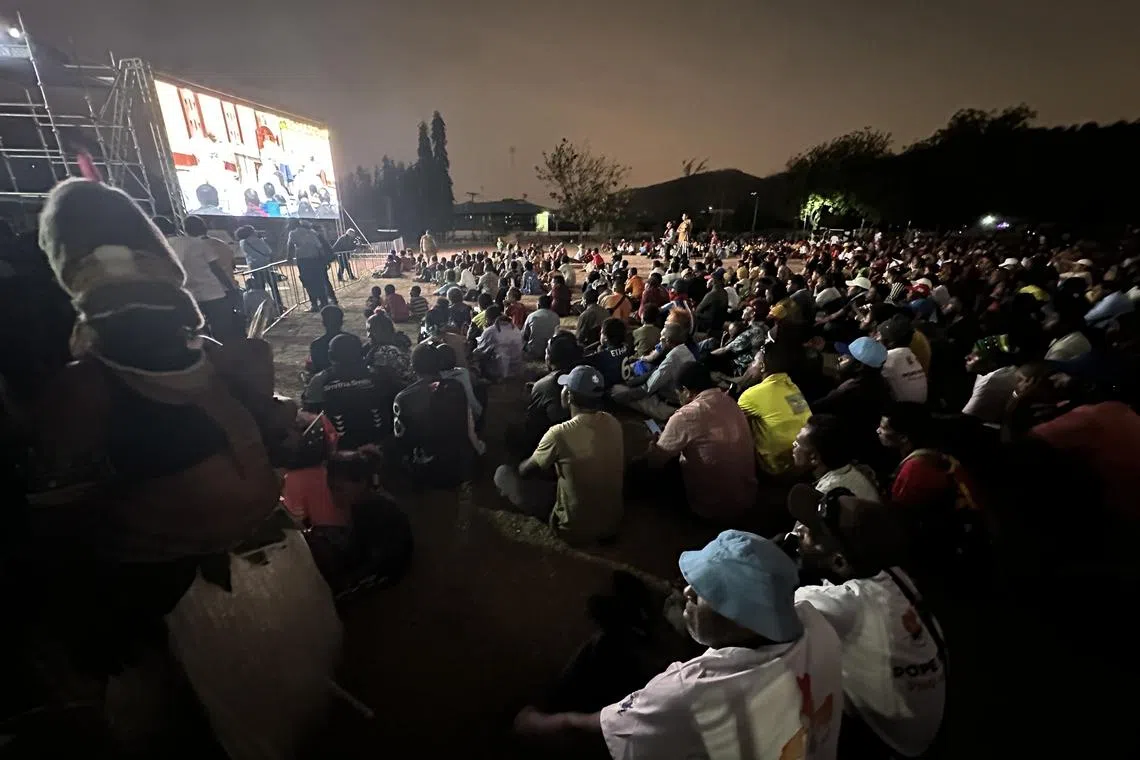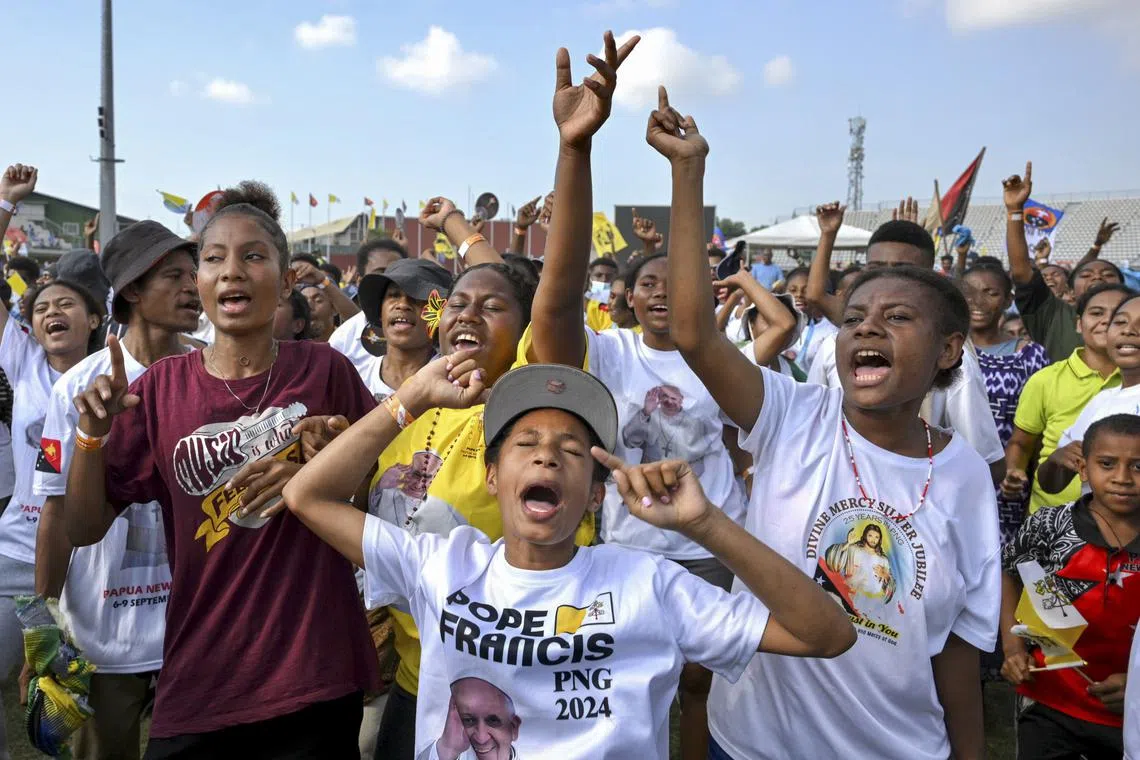Pope Francis takes on Papua New Guinea young people’s biggest source of anxiety – jobs
Sign up now: Get insights on Asia's fast-moving developments
Follow topic:
PORT MORESBY – TikTok, Instagram, K-Pop, anime. You name it.
Information technology undergraduate Roy Baki, 22, is very much into what many young people around the world are interested in as well, although he lives in Papua New Guinea (PNG), the Pacific island nation better known for its untouched nature.
It is also the most far-flung country that Pope Francis is visiting on his 12-day Asia tour.
The lanyard Mr Baki was wearing as a volunteer for one of the Pope’s events bore a photo of Sana from South Korean girl group Twice. Danielle is his “bias” in NewJeans, he offered when this other Korean girl band floated into the conversation after he was asked about the singer on his lanyard.

Mr Roy Baki (right) posing with a finger heart pose as the writer holds up a lanyard with a photo of Sana from South Korean girl band Twice for a selfie. On the left is Mr Baki’s good friend, Ms Kompain Frank.
ST PHOTO: WONG PEI TING
But behind this chirpy image is an anxious youth. He will graduate from the Don Bosco Technological Institute with a bachelor’s degree in IT in 2025 and is “terrified” about what is to come.
He has good reason to feel this way. About 80,000 young people in PNG leave the school system yearly, but fewer than 10,000 are able to find formal jobs, despite the country having one of the world’s youngest populations, with more than 60 per cent below the age of 35.
The situation is especially acute in urban areas such as the capital city of Port Moresby, where more than 60 per cent of youth are unemployed.
Mr Baki already considers himself fortunate – his dad works as a public servant, while his mum is an accountant, and both take home enough to support his education to this point.
Many parents are unable to support their children beyond Grades 10 to 12 – the equivalent of Secondary 4 to the second year of junior college in Singapore – as tertiary education fees are much higher, he said.
Even if there is money, spaces in tertiary institutions are limited, putting many aspirants through a “bottleneck”, he added.
There are many young people with talent and expertise but who lack a degree, leaving them with few ways to kick-start a career of their choice, Mr Baki said.
A doctor in training could, for instance, end up quitting and becoming a deejay, he noted. Most end up working in malls, hotels and food chains or joining a sports team, he added.
Young people turn to online worlds to feel more engaged and maybe learn a thing or two. But a lot of toxicity and negativity has surfaced on social media platforms such as Facebook, he said. “It is easier to get attention that way, as everyone can relate to the negativity. Such things tend to go viral.”
He added that it is really hard for young people to be optimistic.
This was the state of the country that Pope Francis landed in on Sept 6. The 87-year-old Argentinian pontiff wasted no time addressing this when making his first speech before government officials, businessmen and civil society members at Apec Haus, a conference venue.
Right after making basic introductions and acknowledging the country as an archipelago with hundreds of islands, more than 800 spoken languages and extraordinary cultural and human richness, the Pope said the country’s trove of natural resources should be destined for the “entire community”.
Even if external experts and large corporations must be involved in harnessing the resources, it is “only right that the needs of local people are given due consideration” when distributing the proceeds and employing workers, the Pope stressed.

Students posing with violins at Holy Trinity Humanities School during Pope Francis’ visit, in Baro, near Vanimo, Papua New Guinea, on Sept 8.
PHOTO: REUTERS
Boss men and boss women
The problem of high unemployment rates among PNG’s youth stands out more starkly when considered against the small number of foreigners who often occupy managerial roles.
While PNG shares a large land border with Indonesia, spanning more than 820km, it is rare to find an Indonesian who works here.
There is no direct flight from Indonesia to PNG; the usual cities of transit between the two countries are Manila, Singapore or Brisbane.
More commonly sighted are residents of its neighbour across the sea – Australians – who are often saluted by locals as “boss man” and “boss meri” as they are usually hired into managerial positions.
Filipinos are another distinct group, with many spotted in the field before the Shrine of Mary Help of Christians in Don Bosco Technological Institute and at the Sunday mass in Sir John Guise Stadium.
Filipina Charmaine Foronda, 40, who has been working in PNG for six years, told The Straits Times that PNG has become a preferred place of employment as its currency, the kina, is stronger than the Philippine peso.
Besides, “here we can practise our professions, not like in other countries”, said the marketing manager who works for a supermarket chain in Port Moresby.
“Here, we work as expatriates, as managers. That’s why most of us work here.”

People gathering in the field before the Shrine of Mary Help of Christians at Don Bosco Technological Institute in Port Moresby, Papua New Guinea, to watch a live cast of the proceedings in the shrine.
ST PHOTO: WONG PEI TING
Rekindling hope
Youth unemployment also came up when ST spoke to Mr John Lau and Dame Sandra Lau, a well-known business couple who own retail and wholesale enterprise Tropicana in PNG.
Mr Lau was born in the caves behind PNG’s Rabaul hills near the end of World War II to a Japanese mother and a Papua New Guinean father, while Mrs Lau is of Malaysian-Chinese descent.

Mrs Sandra Lau and Mr John Lau, a well-known business couple who own the retail and wholesale enterprise Tropicana in Papua New Guinea, at a meeting with the authorities, civil society and diplomatic corps at Apec Haus on Sept 7.
ST PHOTO: WONG PEI TING
Mrs Lau said she hopes the Pope can bring to PNG peace, law and order, as well as love for the people.
“There are a lot of people, but there are no jobs. It’s so sad,” the 75-year-old added.
In his Sept 7 speech, Pope Francis said that stable institutions are needed to bring about lasting change, including increasing opportunities for dignified work.
This comes when leaders agree and cooperate on how they want to bring society forward despite the “different concepts and sensibilities present”, he said.
“Sometimes we forget that human beings need more than just the basic necessities of life. They also need great hope in their hearts,” he added.
This hope was what Pope Francis sought to rekindle on his last day in PNG.

Young people dancing as they wait to meet Pope Francis at Sir John Guise Stadium, in Port Moresby, Papua New Guinea, on Sept 9.
PHOTO: EPA-EFE
On Sept 9, more than 20,000 gathered at Sir John Guise Stadium, with the crowd comprising mainly young faces this time.
The Pope said he did not want to leave the country without meeting the country’s “hope for the future”.
In parting, he said: “Dear young people, it is my hope that you learn the language of love and thus transform your country, because love brings about change, makes you grow and opens paths to the future. Be young people who walk together to realise this dream...
“Do not forget that together, only together and in unity, can we walk towards new horizons, towards the future, towards the dream of a civilisation of love.”
Correction note: An earlier version of this story addressed Ms Kompain Frank as Mr. We are sorry for the error.

